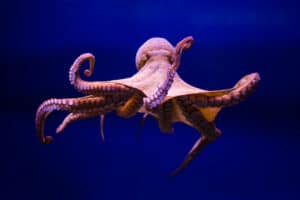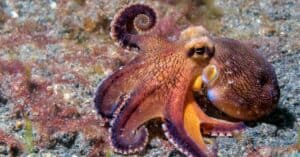From their truly bizarre biology to their impressive intelligence and critical thinking skills, octopuses are incredible animals. If you find them as interesting as we do, you’ve probably wondered at some point if octopuses make good pets. But can these animals even survive, let alone thrive in captivity, or do they belong in the ocean?
Let’s take a look at the octopus, its history in captivity and the pet trade, and whether or not they make good companions for the typical pet owner. In this article, you’ll learn if you could get a pet octopus, and if so, whether you would want.
A Brief Introduction to the Octopus
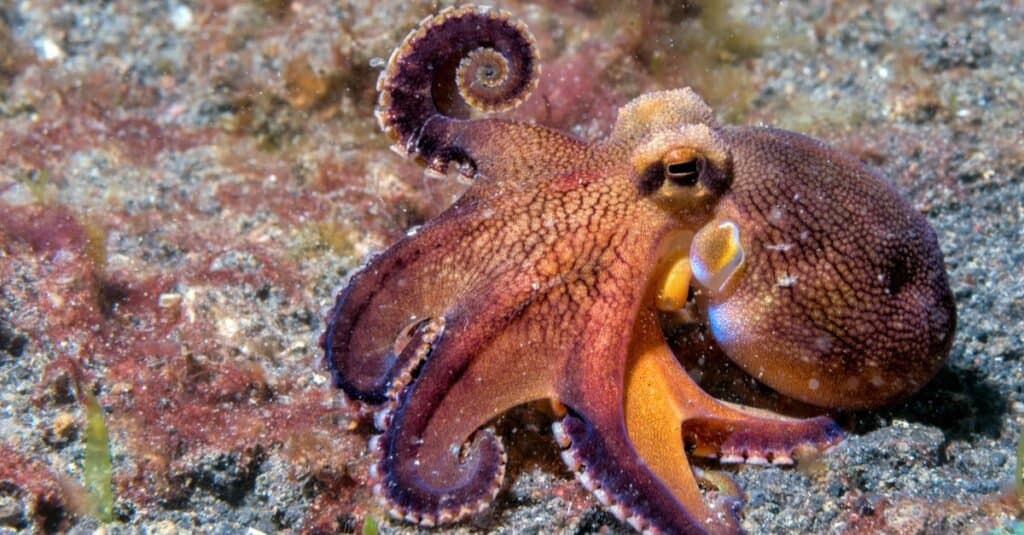
There are hundreds of different kinds of octopuses, with arm spans ranging in size from a few inches to well over 15 feet.
©Andrea Izzotti/Shutterstock.com
Octopuses are marine invertebrates with eight limbs and soft bodies with no shells. The class they belong in, Cephalopoda, actually means “head foot/feet” in Latin, a nod to these animals’ strange biology and body orientation.
More specifically, we classify octopuses within the Octopoda order. Within this grouping, there are more than 300 unique species of octopuses of widely varying colors, habitats, diets, and sizes. Rather than swimming by using their eight long, flexible limbs to tread water, octopuses use a small siphon to shoot jets of water to move around in a process called jet propulsion.
As cephalopods, octopuses are closely related to squids, cuttlefish, and the somewhat strange-looking nautilus. Several animals within this class have strong, beaked mouths and can expel ink via ink sacs near their gills as a defense mechanism.
Interestingly, octopuses are likely the most intelligent invertebrates in the world. They’re also smarter than many vertebrates! Their brains are very large compared to their body size, and their nervous systems are surprisingly complex compared to most other inverts. Their vision is also exceptional.
Most species of octopuses are solitary and prefer living alone aside from when they are mating. They are quite reclusive and spend much of their time living in burrows or dens in the sand or in hollows and crevices in large rocks. Some species, like the famous blue-ringed octopus, are highly venomous.
In more recent years, octopus pets have become rather popular resulting in the presence of many smaller varieties of these marine mollusks in the pet trade. More commonly, they are used in medical and biological research owing to an interest in their regenerative and camouflaging abilities.
Can Octopuses Legally Be Kept as Pets?
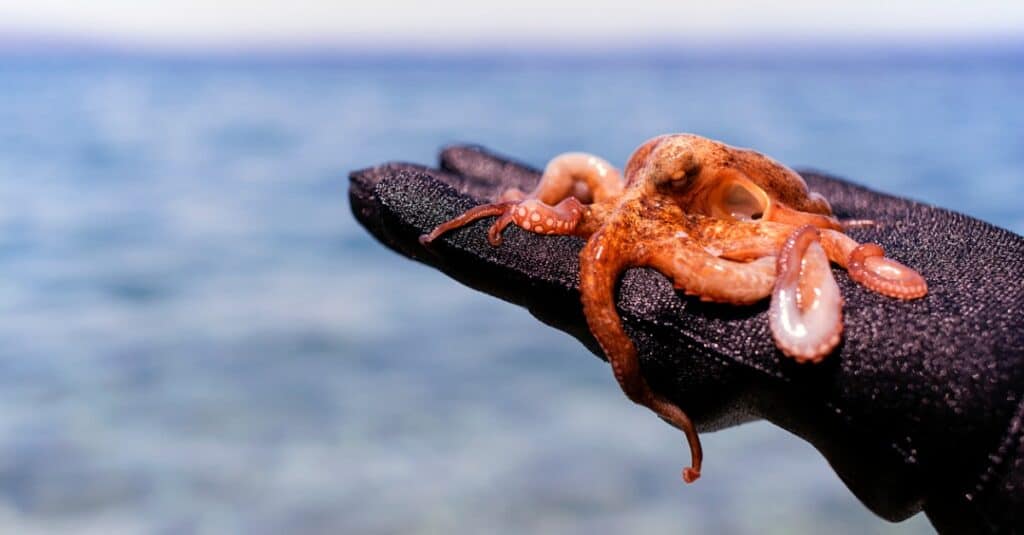
Many species of octopuses are sold in the pet trade, and they are becoming especially popular amongst experienced saltwater aquarium hobbyists.
©iStock.com/feyyazalacam
In many regions, there are no specific legal restrictions on the ownership of octopus pets. However, this could change in the future as they become more popular amongst aquarium hobbyists. Additionally, many states and countries have laws on the import and export of wild animals, even if they don’t specifically mention octopuses.
If you’re interested in buying and keeping a pet octopus of your own, be sure to check with local wildlife authorities on their legality and if any kind of permit is required. Laws surrounding the ownership of certain animals (especially wild animals) as exotic pets often change over time, so stay up-to-date!
Keep in mind, too, that most species aren’t bred in captivity, so most are wild-caught. Unfortunately, octopuses don’t breed well in captivity. Virtually all species, even the smaller varieties, are also quite challenging to care for in general, which we’ll cover in more detail below.
Do Octopuses Make Good Pets?
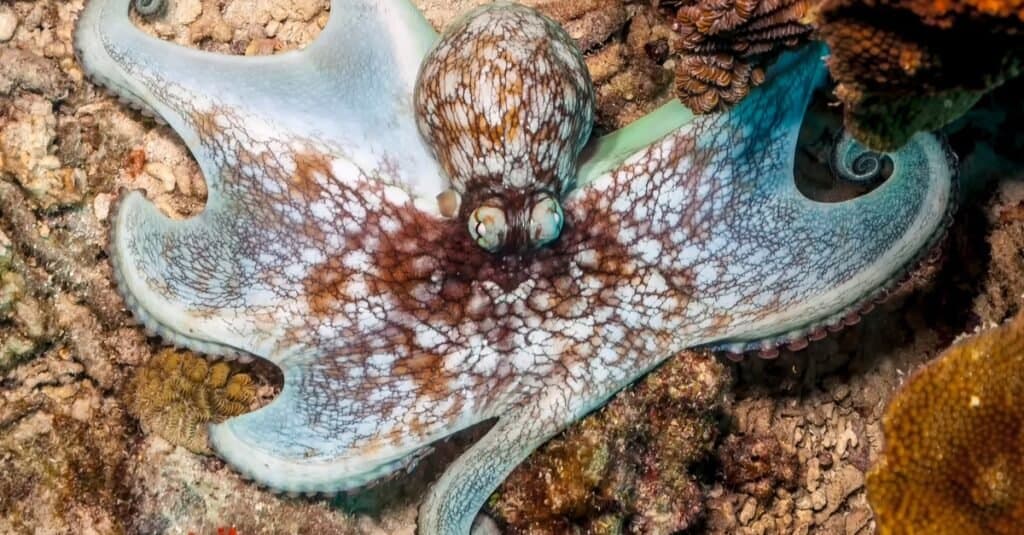
The Caribbean reef octopus can be a good pet, though it is quite high-maintenance.
©John A. Anderson/Shutterstock.com
Octopuses technically can make good pets for experienced aquarium hobbyists. However, they are far from ideal pets for beginners. There are many reasons why they are challenging to house in captivity, as their care needs are very specific and costly.
For starters, octopuses are intelligent, social, and active animals, so they become bored and stressed easily in captivity without lots of space and ample enrichment. This also makes them adept escape artists! Even smaller species like the dwarf octopus need to live in decently large tanks to thrive.
Another important factor is the high cost of feeding a pet octopus. Most species eat a variety of crustaceans, mollusks, and fish, which can be difficult to find and expensive to provide. Most octopuses won’t eat frozen or pre-packaged food. They strongly prefer live prey, and they can be picky eaters.
Housing octopuses with other fish and marine animals is also tricky. Many species don’t cohabitate well with other animals. In most cases, they do best in a tank all to themselves. Plus, since octopuses have sensitive skin, most species only tolerate a small, specific range of pH levels.
In short, octopuses need consistently high-quality, specialized care. If you go on vacation, someone you trust will need to properly care for your octopus in the meantime. They can’t be alone for very long. You’ll need to closely monitor the tank conditions on a daily basis to keep your octopus healthy and happy.
Finally, veterinary costs can be especially exorbitant, as very few vets work with octopuses specifically. Even though octopuses don’t have very long lifespans (usually around 1 to 5 years at most), you’ll still need to do a lot of preparation, especially financially, to properly care for one of these magnificent animals.
What Do Octopuses Need in Captivity?
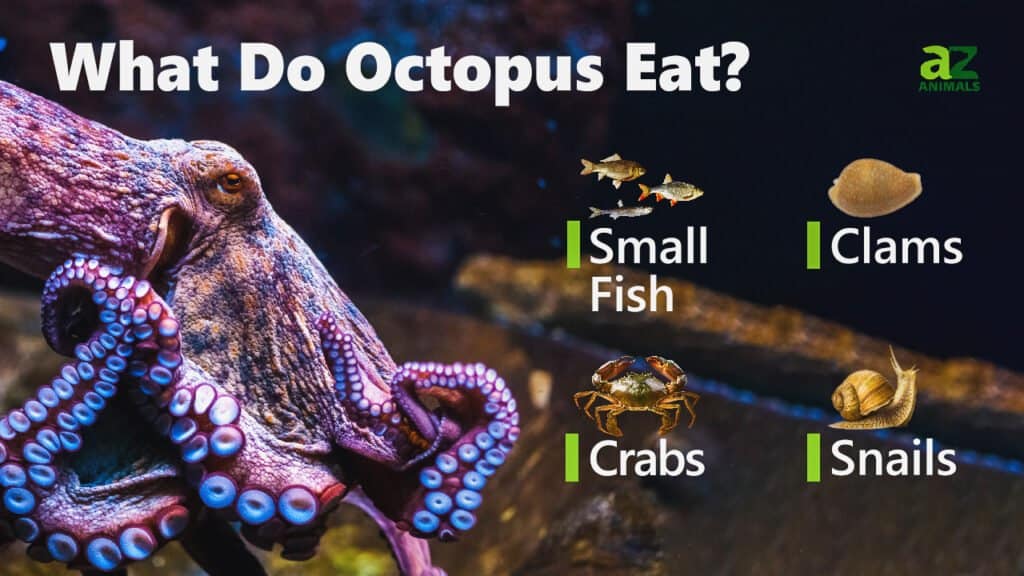
If you’re determined to keep an octopus as a pet, you’ll need to invest a substantial amount of money into their tank, food, and miscellaneous supplies like tank decor and a water filter. Be sure to fully set up your octopus tank before bringing them home. This way, you can make sure the water temperature, pH level, tank size, filter, and other specifics are all just right for your particular species of octopus.
When choosing which species to keep as a pet, it’s best to opt for something small, especially if it’s your first pet octopus. Smaller varieties eat less, require less space, and are generally easier to care for overall. Some species commonly kept as pets include the Atlantic pygmy octopus, the California two-spot octopus, and the common octopus.
From there, you’ll need to determine what size tank and any other supplies you’ll need for your new eight-legged friend. Most smaller species require at least 50 gallons of space to thrive, and a bigger tank is always better. Learn what temperatures and pH levels your pet octopus needs. Depending on the species, a water heater may be beneficial.
Some other supplies you’ll likely need for a pet octopus include:
- A water filter, ideally a wet-dry filter for saltwater aquariums
- Substrate for the bottom of the tank (usually a mixture of sand and live rock from the ocean)
- Sturdy, natural-looking tank decorations for enrichment like hides, plants, rocks, shells, etc.
- A protein skimmer to remove waste
- A powerhead to prevent waste from accumulating on the tank floor
- An extra-secure lid for the tank to prevent escape attempts
- A plain fluorescent light for viewing
Can Octopuses Bond with Humans?
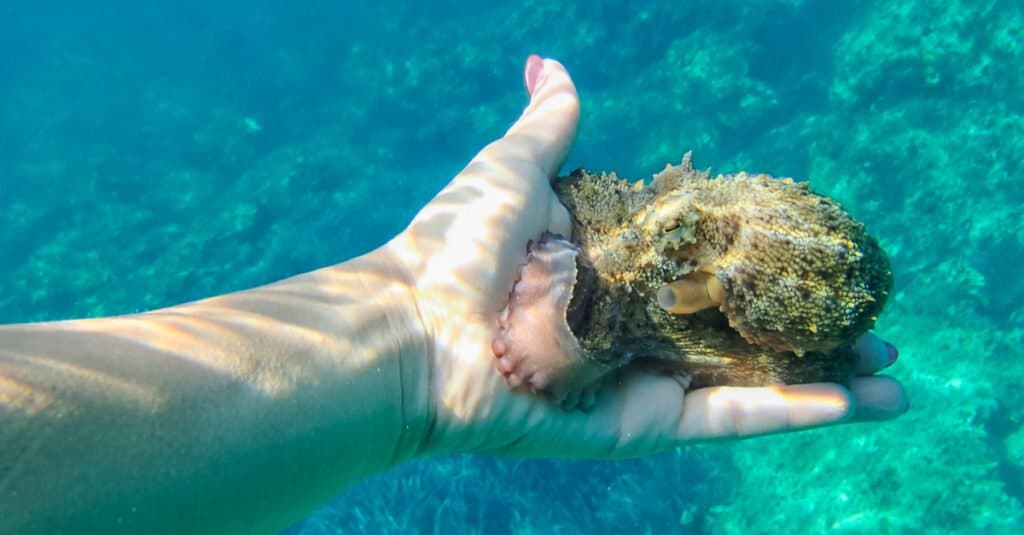
Of the more than 300 species, octopuses have shown that they are inquisitive, playful, and resourceful, and often seek out human interactions.
©RaDoll/Shutterstock.com
These eight-legged animals are not only one of the most highly evolved invertebrates but they are also considered, by many biologists, not just one of, but the most intelligent creatures. Of the more than 300 species in the order Octopoda, octopuses have shown that they are inquisitive, playful, and resourceful. Each species has different characteristics and there are even some that are known to cuddle with each other.
Bonding with humans is another enjoyment for some species, as well as the humans involved, who get to interact with these smart cephalopods. In the film, My Octopus Teacher, this bond is captured during the filmmaker’s journey to showcase himself befriending a small mollusk. Those who look after octopuses have even highlighted that there are many of the species that willingly seek these interactions, whether through companionship, play, or touch.
The photo featured at the top of this post is © John A. Anderson/Shutterstock.com
Thank you for reading! Have some feedback for us? Contact the AZ Animals editorial team.



